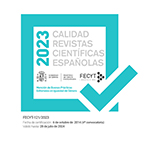Introduction to artistic practice as research: A method of activating educational processes for academic and collective development
Abstract
This article traces the concept of artistic practice as research in the European context, starting from authors who open a trail that defends and corroborates that the analysis of the artistic work itself can be scientific, that it has value as research and as a source of knowledge. These theorists transcend the use of the arts as a method of study, claiming the right of artists to contribute to knowledge, both practical and non-practical, with the same legitimacy as traditional research, monopolised for centuries by philosophers, art historians, philologists, critics or art curators. In these pages, I describe the transformation of the gaze on the work of art proposed by artistic practice as research, stimulating new generations of artists to work under the paradigm of creative freedom; an art involved in society, history and politics, which ceases to be representational and becomes self-critical, in an open process of reflection and exploration that never ends. Hence, it is not only the final result of the work or an artistic concept that is relevant, but also the observation of the processes themselves, which entails both greater academic development and the advancement of projects that benefit society as a whole, working for individual and collective change.
Downloads
Article download
License
In order to support the global exchange of knowledge, the journal Arte, Individuo y Sociedad is allowing unrestricted access to its content as from its publication in this electronic edition, and as such it is an open-access journal. The originals published in this journal are the property of the Complutense University of Madrid and any reproduction thereof in full or in part must cite the source. All content is distributed under a Creative Commons Attribution 4.0 use and distribution licence (CC BY 4.0). This circumstance must be expressly stated in these terms where necessary. You can view the summary and the complete legal text of the licence.










